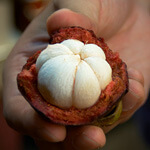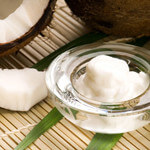 The purple mangosteen is a tropical tree that is native to Southeast Asia but also grows in South America and other consistently warm climates. It bears sweet, juicy fruits that are characterized by their fragrant white flesh and inedible purple rinds. Mangosteens are universally cherished for their nutritional value, and mangosteen products – including mangosteen juice and powder – have become immensely popular in the Western world. Below is a list of reasons why these strange, peach-sized fruits are often considered superfruits.
The purple mangosteen is a tropical tree that is native to Southeast Asia but also grows in South America and other consistently warm climates. It bears sweet, juicy fruits that are characterized by their fragrant white flesh and inedible purple rinds. Mangosteens are universally cherished for their nutritional value, and mangosteen products – including mangosteen juice and powder – have become immensely popular in the Western world. Below is a list of reasons why these strange, peach-sized fruits are often considered superfruits.
List of Health Benefits
Bursting with antioxidants – Most fruits contain varying amounts of antioxidants, but mangosteen seems to specialize in them. Some of the antioxidants found in it include catechins (considered by researchers to be five times more effective at scavenging free radicals than vitamin C), stilbenes (which possess excellent anti-fungal properties, even after digestion), quinones (potent anti-bacterials), and a large number of polyphenols, which are even stronger antioxidants than vitamin E. Furthermore, mangosteens contain 40 out of the 200 xanthones known to science. Xanthones, which are extremely powerful antioxidants, are only found in a handful of tropical fruits and possess anti-allergen, anti-inflammatory, and anti-convulsant properties. This makes mangosteen an excellent choice for treating asthma, eczema, allergies, fibromyalgia, arthritis, cardiovascular diseases, and many other serious conditions.
Weight loss properties – Mangosteen is a great weight loss food for numerous reasons. Firstly, it is highly fibrous: one serving (100 grams) of fresh mangosteen contains 5.1 grams of dietary fiber, or 20 percent of an adult’s recommended daily intake. Fiber helps us absorb water from the colon, which makes us feel fuller for longer and discourages overeating. It also sweeps the intestinal tract of accumulated waste. Secondly, one serving of fresh mangosteen contains only 63 calories, no cholesterol and 0.40 grams of fat. Thirdly, mangosteen is a natural energy booster, making exercise sessions easier, more enjoyable, and potentially longer-lasting.
Mineral content – Though mangosteen is primarily consumed for its antioxidants, it does provide us with varying amounts of macro and trace minerals. These include potassium, copper, iron, manganese, magnesium, zinc, and calcium. These minerals work together to promote superior body health and play an important role in cellular metabolism. Potassium in particular is an important component of cell and body fluids and helps to control blood pressure and heart rate. Thus, mangosteen can protect us from strokes and coronary heart diseases.
B-vitamin complex – Mangosteen contains respectable amounts of several B-vitamins, such as niacin, folate, riboflavin, and thiamin. This chemically related family of nutrients helps the body to metabolize protein, fats, and carbohydrates. B-vitamins also provide mood-boosting benefits, largely because some of them are responsible for making neurotransmitters like serotonin. This makes mangosteen a good choice of fruit for individuals suffering from depression and lethargy.
Note: Mangosteens were once illegal in the United States because food authorities erroneously believed that they harbored Asian fruit flies. However, this ban was lifted in 2007, and Americans are now free to enjoy mangosteen and mangosteen products.






